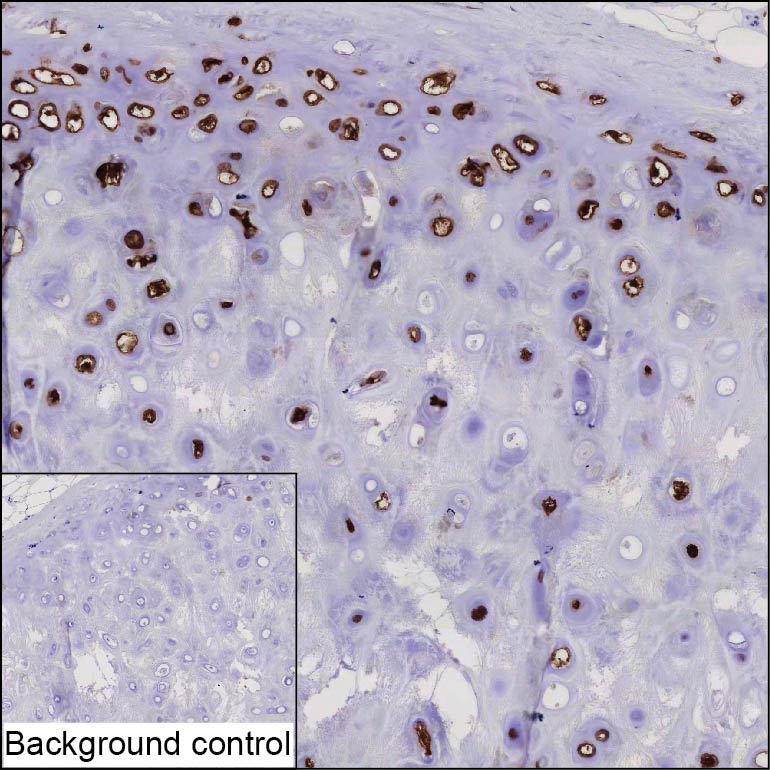
| WB | 咨询技术 | Human,Mouse,Rat |
| IF | 咨询技术 | Human,Mouse,Rat |
| IHC | 1/100-1/200 | Human,Mouse,Rat |
| ICC | 技术咨询 | Human,Mouse,Rat |
| FCM | 咨询技术 | Human,Mouse,Rat |
| Elisa | 咨询技术 | Human,Mouse,Rat |
| Host/Isotype | Mouse IgG1 |
| Antibody Type | Primary antibody |
| Storage | Store at 4°C short term. Aliquot and store at -20°C long term. Avoid freeze/thaw cycles. |
| Species Reactivity | Human |
| Immunogen | Purified recombinant fragment of human COL9A2 |
| Formulation | Purified antibody in PBS with 0.05% sodium azide |
+ +
以下是关于COL9A2抗体的示例参考文献(注:内容为示例性概括,建议通过学术数据库核实最新文献):
1. **"Mutations in collagen IX (COL9A2) cause multiple epiphyseal dysplasia"**
- **作者**: Briggs, M.D. et al.
- **摘要**: 研究揭示了COL9A2基因突变与多发性骨骺发育不良(MED)的关联,通过抗体检测发现突变导致胶原IX结构异常,影响软骨功能。
2. **"Collagen IX deficiency leads to early-onset osteoarthritis in mice"**
- **作者**: Fässler, R. et al.
- **摘要**: 利用COL9A2抗体分析基因敲除小鼠模型,发现胶原IX缺失引发关节软骨退变,为骨关节炎机制提供证据。
3. **"Autoantibodies to collagen IX in osteoarthritis patients"**
- **作者**: Nakki, A. et al.
- **摘要**: 检测骨关节炎患者血清中抗COL9A2的自身抗体,探讨其作为疾病生物标志物的潜力及在病理中的作用。
4. **"Molecular cloning and tissue distribution of COL9A2 in human cartilage"**
- **作者**: Wu, J.J. & Eyre, D.R.
- **摘要**: 通过特异性抗体定位COL9A2蛋白在软骨组织的表达,分析其在细胞外基质组装中的关键功能。
建议通过PubMed或Google Scholar以“COL9A2 antibody”为关键词检索获取最新文献。
The COL9A2 antibody targets the alpha-2 chain of type IX collagen, a critical component of the extracellular matrix (ECM). Encoded by the COL9A2 gene, this chain combines with alpha-1 (COL9A1) and alpha-3 (COL9A3) chains to form heterotrimeric type IX collagen molecules. These molecules are structurally associated with type II collagen fibrils in cartilage, contributing to ECM stability, tissue integrity, and chondrocyte-matrix interactions. COL9A2 plays a role in cartilage homeostasis and joint function, with mutations linked to skeletal disorders like multiple epiphyseal dysplasia (MED) and early-onset osteoarthritis.
COL9A2 antibodies are essential tools for studying the expression, localization, and functional roles of this protein in health and disease. In research, they are used in techniques such as Western blotting, immunohistochemistry, and immunofluorescence to analyze COL9A2 distribution in tissues, particularly cartilage, and to investigate its involvement in degenerative joint conditions. Commercially available antibodies are typically raised in rabbits or mice using peptide antigens specific to human COL9A2. validated for cross-reactivity in model organisms.
Clinically, COL9A2 antibodies may aid in diagnosing genetic collagenopathies or monitoring cartilage degradation biomarkers. However, challenges include ensuring specificity due to structural similarities among collagen family members. Ongoing studies explore their potential in therapeutic development, such as targeting ECM remodeling pathways in osteoarthritis.
×